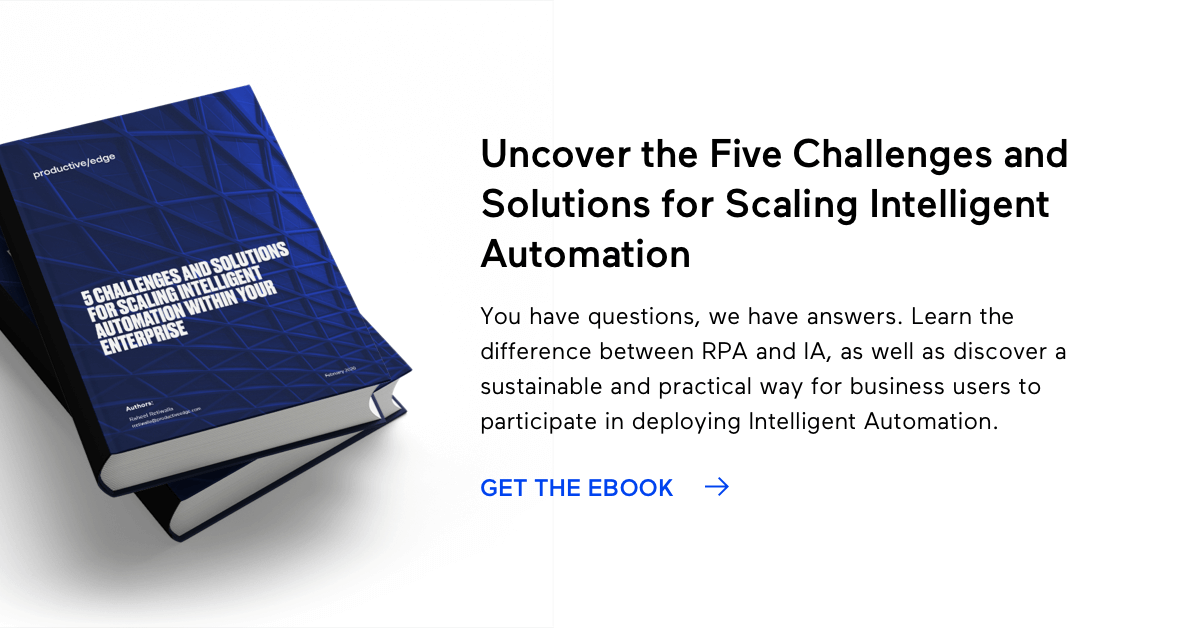Healthcare providers face patient demands, needing to accomplish more with limited resources. Staff are responsible for manual and time-consuming tasks, such as digitizing patient files, optimizing appointment schedules, and executing billing and claims processing, ultimately detracting from patient-focused care.
To improve these pain points, healthcare providers are starting to embrace digital transformation. Robotic Process Automation (RPA) in healthcare enables the automation of business processes, driving improved efficiency and growth while enhancing patient care.
Managerial, back-office and patient-facing processes offer ample opportunities primed for RPA optimization and intelligent automation, enabling tailored patient care, reduced costs and enhanced efficiency.
Top 4 Benefits of RPA in Healthcare
RPA brings numerous benefits to healthcare providers. With less time spent on manual tasks, staff members can focus more on providing better patient care and staying HIPAA compliant while reducing costs.
1. Improved Patient Support
Patient care is one of the most crucial aspects of healthcare, and as technology continues to advance, so does the potential for enhancing patient outcomes. McKinsey & Company reported that ⅔ of respondents experienced positive outcomes when using automation, citing improvements in quality control, customer satisfaction and employee experience.
RPA allows healthcare providers to improve their patient-facing operations and offer superior care tailored to individual needs. By automating repetitive and time-consuming tasks, RPA allows doctors to streamline administrative processes, giving them greater bandwidth to focus on priority areas. This heightened level of focus fosters a deeper doctor-patient relationship, as physicians can spend more time understanding their patients' medical histories and concerns. Consequently, patients feel valued and empowered in their healthcare journey, knowing that their medical professionals are fully invested in their well-being.
2. Better HIPAA & Data Compliance
Failing to be HIPAA compliant is a costly error for healthcare providers and one of their top concerns. For example, The University of Rochester Medical Center (URMC) was fined $3 million because of unencrypted flash drives. Though healthcare providers rely on many different applications with complicated security landscapes, RPA makes HIPAA compliance easier to manage when storing patient data.
RPA facilitates role-based access, a mechanism that limits system entry based on permissions and privileges, ensuring that only authorized users can access the system. This security measure grants healthcare providers the ability to assign personalized security clearances to individuals, such as doctors, IT staff, or claims departments, who may have different levels of access. Moreover, RPA can be configured to automatically maintain comprehensive audit histories, enabling internal or external auditors to access them in case of a breach or emergency.
3. Reduced Costs
By using robots to carry out numerous labor-intensive assignments, employees are afforded the opportunity to concentrate on higher-level ventures. Additionally, the financial investment required for a robot is usually ⅕ the cost of employing a full-time healthcare staff member.
Through the implementation of RPA, healthcare providers can harness an economical workforce and assign human workers more meaningful tasks, driving growth and substantially decreasing operational costs for mundane, repetitive tasks.
4. Less Repetitive Work
With RPA, healthcare staff can focus on delivering care rather than entering data. For example, nurses spend a large portion of their time monitoring email inboxes or entering information in multiple applications. According to McKinsey & Company, 70% of survey respondents say their organizations are piloting automation technologies in one or more business units or functions. Streamlining repetitive tasks, such as data input or application entry, allows providers to better focus on their role and facilitate improved patient care.
RPA Use Cases in Healthcare
If a healthcare provider chooses to implement RPA, how do they decide which processes to automate? There are many manual patient-facing and back-office processes available for automation. Here are five examples of healthcare Robotic Process Automation use cases:
1. Easier Appointment Scheduling
More and more patients are scheduling appointments online, requiring providers to collect sensitive personal information and insurance details digitally. Once the information is collected, the staff has to determine which doctors have availability - a tedious process when multiple appointments are scheduled every day.
If a patient needs to see a specialist, such as a neurologist, the appointment is booked according to the provider’s timing. For example, if patients are scheduled to see a specialist and the provider must cancel last minute, the hospital staff needs to inform the patients via a phone call or email beforehand. Implementing RPA in healthcare can send out automatic communications regarding appointment updates and reduce scheduling errors according to diagnosis, need, doctor availability, and other important criteria. Additionally, systems can scan patient data to generate reports for referral management representatives to create or modify appointment changes.
2. Patient Discharge Instructions
RPA can significantly streamline patient discharge instructions by automating the creation of personalized templates based on patient conditions and treatment plans, eliminating the need for manual input. With seamless integration into electronic health records (EHRs), automation can reduce errors and verify that all necessary information is included by scan discharge orders, ensuring instructions are up-to-date, accurate and compliant with healthcare regulations.
Additionally, patients receive timely and personalized correspondence via email, SMS or patient portals, reducing misunderstanding and improving patient-provider communication. Automated follow-up reminders and links to educational resources empower patients to take an active role in their healthcare journey. Through data analytics, healthcare providers continuously improve discharge processes, fostering a more efficient and patient-centric healthcare system, ultimately leading to improved patient outcomes and satisfaction.
3. Improved Claims Processing
Effective claims processing and management are some of the biggest hurdles in the world of hospital administration, as medical facilities face a large volume of claims that traditionally involved a multi-step claims process.
RPA can streamline this overly manual process by automating the daily transfer of individual claims files to File Transfer Protocol (FTP) servers. When the files are detected on the FTP server, an RPA task launches and combines the patient files and securely transfers them from the Health Information System (HIS) to the Claims Management System.
RPA software can also automate the auditing process by parsing claims files to extract critical information and ensuring no claims are overlooked. In the event that the number of claims processed does not match the expected total, an audit report is generated, notifying hospital staff of the error.
4. Managing Day-to-day Workflows
In the past, healthcare providers had to manually handle daily operations like care coordination, remote monitoring, population wellness and staff scheduling. Despite being incredibly time-consuming, these manual, routine tasks are these essential tasks are crucial for efficient institutional functioning.
Although automating administrative tasks enhances overall efficiency, RPA can only handle structured data and follows rule-based methods. Intelligent Process Automation (IPA) addresses this limitation by utilizing machine learning to process unstructured data and make informed choices.
Applications developed using IPA surpass those relying solely on RPA by being smarter, more adaptable, and capable of making intelligent choices. Similar to having a highly intelligent robot versus a basic one, IPA apps provide enhanced capabilities, empowering businesses to achieve more advanced and refined automation, ultimately yielding superior results.
5. Speed Up Account Settlements
Healthcare providers must monitor patient costs to ensure their institutions remain cost-effective, while also ensuring patients stay up-to-date with their payments. This complex task involves calculating expenses related to tests, doctor fees, examination rooms, and various other facilities, consumes valuable time and introduces the risk of human error, especially when multiple hospital staff members are involved in the tracking process.
Organizations can overcome these challenges by leveraging RPA to streamline financial operations, determine patient costs and keep track of payments, ultimately reducing payment delays and inaccuracies, enhancing overall financial efficiency and speeding up account settlements.
Conclusion
As more healthcare providers consider RPA, these vendors have HIPAA-compliant RPA technology, proven to improve operations and reduce overall costs.
- UiPath develops a platform for healthcare RPA and other industries.
- Automation Anywhere is another leading provider of healthcare RPA bots.
- WorkFusion provides healthcare providers with at-scale AI-driven automation and RPA software.
By embracing RPA, healthcare providers can improve the patient experience while reducing costs and improving efficiency. Increased automation combined with more efficient processes will make the day-to-day easier for staff as they’ll spend less time on tedious manual work, and more time on patient wellness.
By teaming up with other leaders in this field such as Workfusion, UiPath, and Automation Anywhere, we are able to provide clients with instant results, using tactics like data alignment, problem framing, road mapping and piloting new RPA bots.
Ready to implement RPA? Download our recent eBook, 5 Challenges and Solutions for Scaling Intelligent Automation Across The Enterprise, and contact us to learn how our technology and digital strategy consultants can help you jumpstart your implementation journey.





